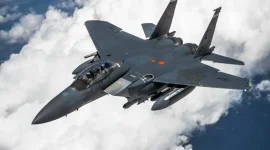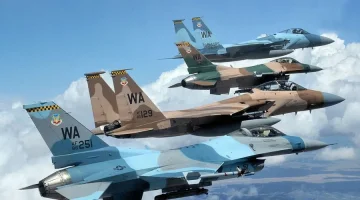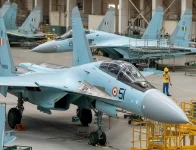- Views: 6K
- Replies: 75

India's Multi-Role Fighter Aircraft (MRFA) competition is heating up, with global aerospace giants vying to supply the Indian Air Force (IAF) with its next generation of fighter jets.
While technological prowess and capability are paramount, production rate is a critical factor that can significantly impact the timely delivery and overall success of the program.
The IAF seeks to rapidly modernize its fleet and maintain a steady acquisition timeline. This necessitates a supplier with the capacity to meet India's ambitious requirements. Let's examine the production capabilities of the leading MRFA contenders:
American Muscle: F-15EX and F-21
- F-15EX (Boeing): Boeing's F-15EX, the latest iteration of the iconic F-15 Eagle, benefits from existing production lines and modernization efforts already underway for the US Air Force. Boeing's St. Louis facility can churn out 24 to 36 F-15EXs annually, with the potential for rapid expansion.
- F-21 (Lockheed Martin): Lockheed Martin's F-21, a customized variant of the F-16 specifically designed for India, leverages the company's vast experience in high-rate F-16 production. Lockheed Martin has delivered 30-40 F-16s per year at peak production and proposes establishing an Indian production line in collaboration with Tata Advanced Systems, further boosting potential output.
European Contenders: Rafale and Typhoon
- Rafale (Dassault Aviation): Dassault Aviation, manufacturer of the Rafale, currently produces 11-15 aircraft per year. While Dassault has consistently met delivery schedules, it operates on a smaller scale than its American counterparts and currently has a production backlog due to 180 Rafale jets order from countries including Egypt, Greece, the UAE, and Indonesia. To meet India's ambitious acquisition timeline, Dassault would need to significantly ramp up production or establish an Indian assembly line.
- Typhoon (Eurofighter GmbH): With a peak production rate of 20-25 aircraft per year, the Typhoon's production capacity fluctuates based on demand from partner nations. While flexible, establishing a new production line in India would require significant investment and time.
Swedish and Russian Entries: Gripen and Su-35
- Gripen E/F (Saab): Designed for rapid scale-up, Saab currently produces 16-20 Gripen E/F jets per year. The proposed technology transfer and local production line in India could significantly increase this capacity.
- Su-35 (United Aircraft Corporation): Russia's Su-35 faces production limitations due to lower demand and a focus on the newer Su-57. The United Aircraft Corporation (UAC) can produce 10-15 Su-35s annually, but significant expansion would be needed to meet India's requirements.
The American Advantage
Based on current production capabilities, the F-15EX and F-21 emerge as frontrunners, offering the highest production rates among the contenders. The Gripen E/F and F/A-18 Super Hornet also demonstrate robust production potential. However, the Rafale, Typhoon, and Su-35 may require significant production expansion or Indian partnerships to fulfill the IAF's requirements.Ultimately, the MRFA decision will hinge on a complex interplay of factors, including capability, technology transfer, and cost. But in the race to equip the IAF with its next generation of fighter jets, production rate will undoubtedly play a crucial role.



